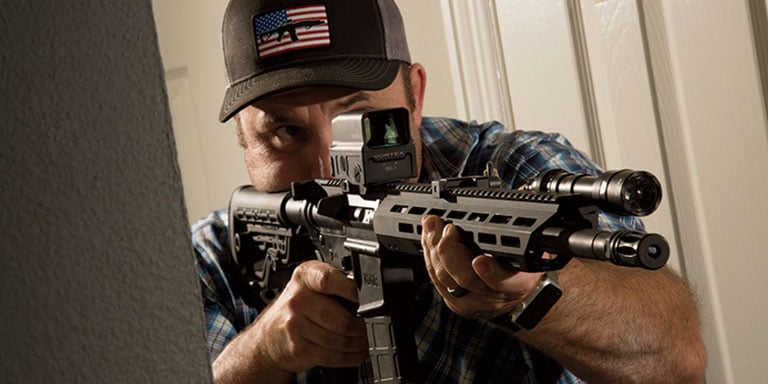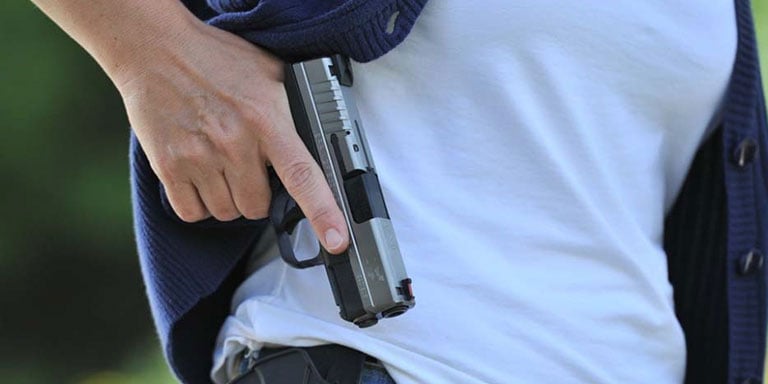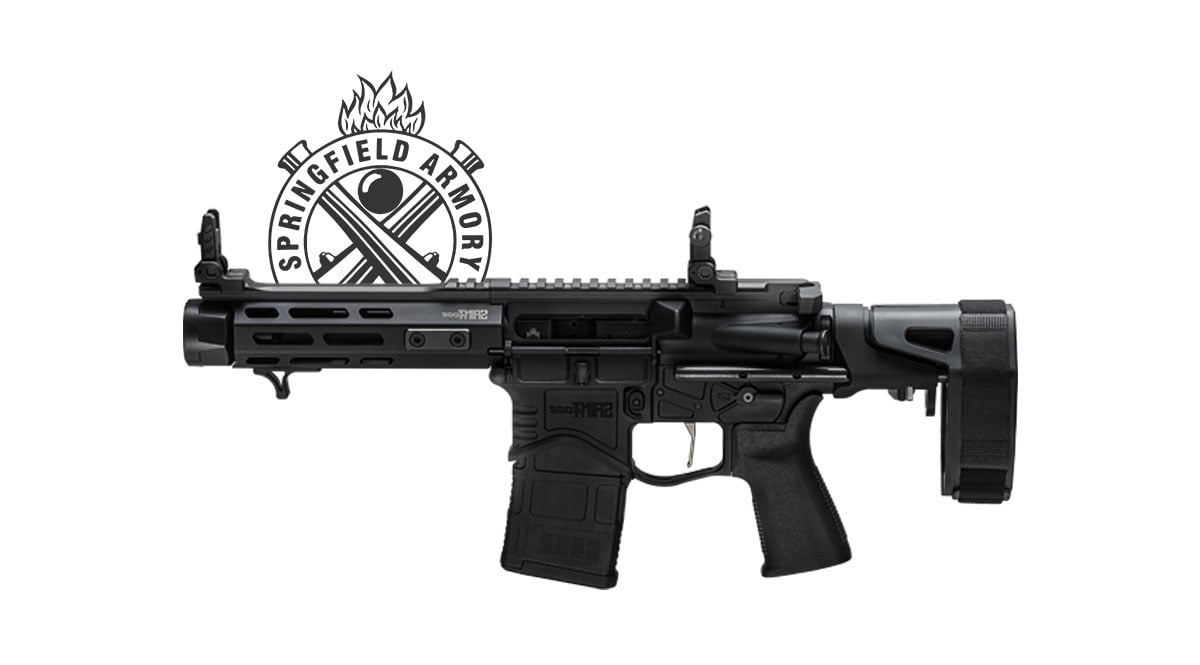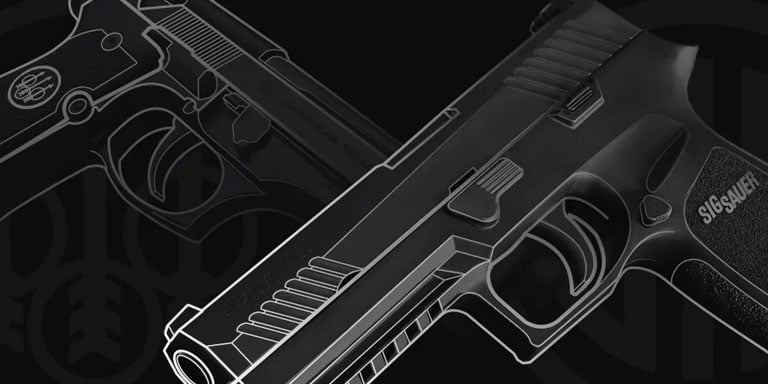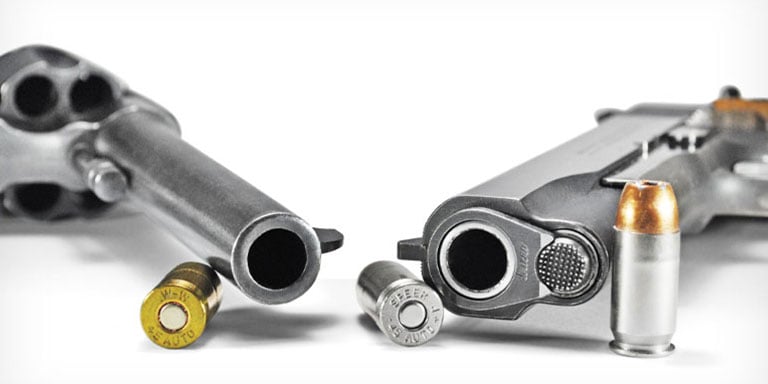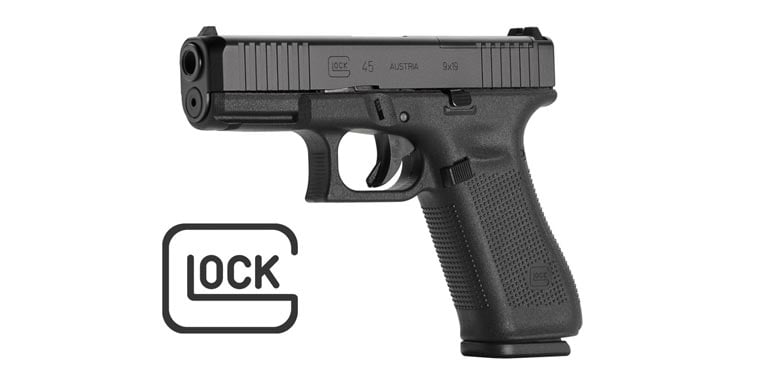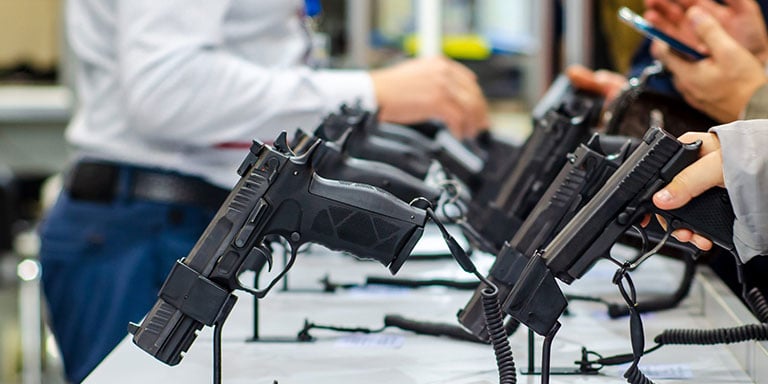
So you've decided to buy a handgun. But what's next? Contrary to what some people claim, you can't just walk into a store and buy a gun as easily as you can get bread or milk — but even if you could, there are still good reasons to take your time and think carefully throughout the process.
Why Do You Want a Handgun?
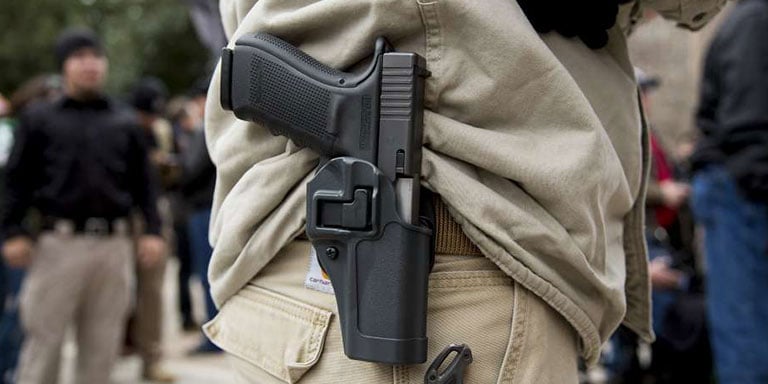
The first question you need to answer is "Why do I want a handgun?" Most people have one of three answers: for self-defense, for recreational shooting or for hunting. Most handguns are designed primarily for one of these uses, and if you buy one ill-suited to your needs, you'll likely have a disappointing experience.
Self-defense handguns typically have good stopping power (more on calibers a bit later), streamlined controls and either a high capacity or good concealability. Sporting handguns are usually small-caliber, affordable and mechanically simple, although organized shooting sport leagues can require all manner of handguns. Hunting handguns are generally heavy, large-caliber revolvers that require confidence and expertise to handle correctly.
If you take some time to get really clear on why you want a handgun and what you want it to do for you, the research and shopping phases will be more productive and enjoyable, and you'll be more satisfied with your purchase in the long run.
Know the Law
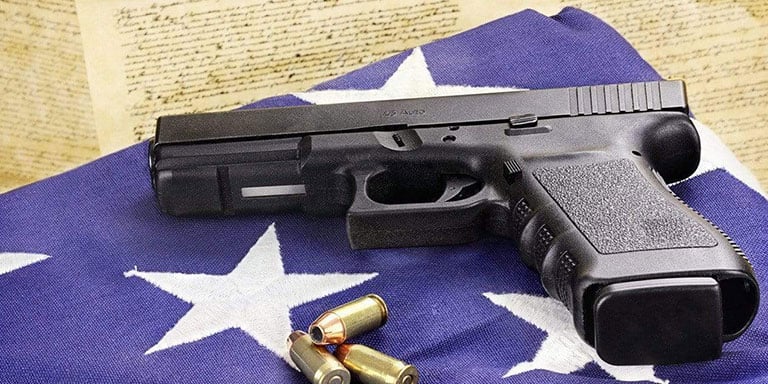
If you live in the U.S., you need to know and abide by federal, state and county firearm laws. In cases where laws from different jurisdictions contradict one another, the stricter law applies.
The first step in becoming a responsible handgun owner is to become thoroughly familiar with these laws. Internet research is a good place to start, but it's best to cross-reference everything you find against several other sources to ensure the information is accurate. Finally, we recommend checking with your local police department or sheriff's office. They can help you ensure that you understand the law, and most will provide concise pamphlets or web pages that you can reference later.
Certain federal laws are pretty basic and apply to all gun owners in all states. In order to buy a handgun legally, you must:
Not have a criminal record, with certain limited exceptions
Pass a strict background check (if you're buying a gun from a licensed firearm dealer; private sellers are not required to conduct background checks on buyers, but most do anyway)
Not suffer from certain mental illnesses that may impair your judgment
Not have undergone treatment for drug or alcohol addiction within the last five years
Be a U.S. citizen or legal immigrant
Be at least 18 if buying from a private seller or 21 if buying from a licensed dealer (note that in most (if not all) states, the minimum age to carry a handgun in public is 21. Also, there is no federal age restriction regarding rifle or shotgun ownership.)
Federal firearm laws don't mandate any particular licensing or training, although many state laws do. Few states require licensing or training in order merely to own a handgun, although most require some form of license or permit in order to carry one in public. Some state laws further distinguish between open and concealed carry, and may require licensing for one but not the other.
A small number of states (notably New York and California) will not issue permits to carry a handgun in public unless you can show proof of a credible threat against your life or property. Although it is legal to carry a handgun in such places in very limited circumstances, for most people, it's effectively illegal.
Be sure to acquire any licenses or permits you'll need before you go shopping for your first handgun.
Concealed Carry
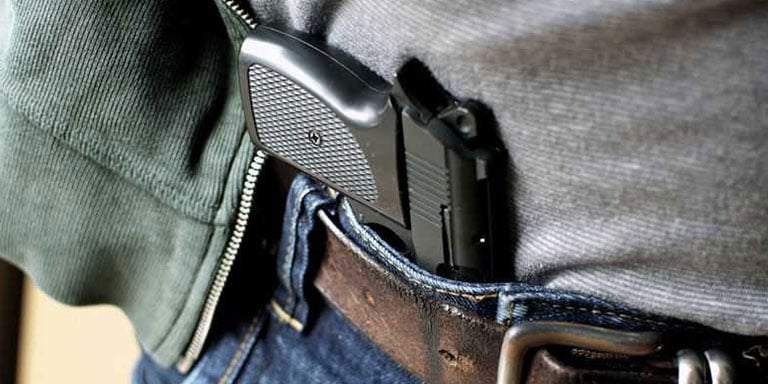
If you plan to buy a handgun for concealed carry, know that there are a few different sets of laws that vary by state. Also, be sure to read our guide on how to choose a concealed carry handgun for more information.
Constitutional Carry (or Unrestricted)
This is the most permissive concealed carry paradigm. If you can legally own the handgun, you can legally conceal it in public, no license or permit required. However, obtaining a license may confer additional privileges. For instance, in Arizona, you may carry anywhere without a permit, except in bars or restaurants that serve alcohol. Obtaining a CCW license allows you to carry in those places as well, with the owner's consent. Note that a CCW permit doesn't override property rights; business owners are free to prohibit weapons on their property for any reason, if they so choose.
Shall-Issue
"Shall-issue" jurisdictions are those in which the sheriff or other relevant authority will issue CCW permits to anyone who applies for one, barring those who fail to meet basic eligibility criteria.
May-Issue
In these places, you may or may not receive a permit if you apply for one. The government agency that makes these decisions does so on a case-by-case basis and may or may not use objective criteria.
No-Issue
The most restrictive states effectively don't allow civilians to carry at all. Local sheriffs may issue a very small number of permits (usually to their friends and allies), but average citizens shouldn't count on getting one.
Choosing the Right Handgun for You
Once you know the law and have a solid understanding of what you want to accomplish by owning a handgun, you're ready to start researching particular models.
Revolver or Semi-Automatic?
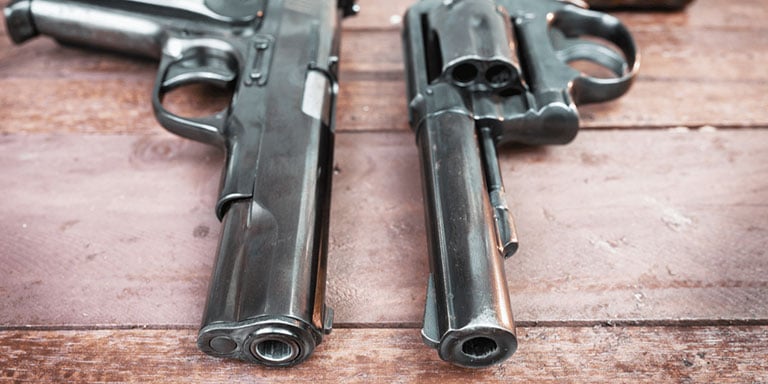
The question of whether to buy a revolver or a semi-automatic handgun is asked by thousands of people every day. Unfortunately, it's often framed poorly. The question is not "Which is better?" but "Which is better for me?" Neither is inherently superior, so it's important to make the decision with respect to your needs (which aren't exactly the same as anyone else's needs).
Revolvers
If you're a brand-new shooter and you aren't yet confident in your ability to handle a handgun safely, a revolver may be a good choice. Revolvers are simpler than semi-autos. They have fewer moving parts, so they malfunction less often, and it's easier to focus on safety and basic shooting fundamentals when you're first learning to handle a handgun. You may also want to choose a revolver if you're on a tight budget, because they tend to be less expensive.
Revolver drawbacks include low ammunition capacity, slow reloads and somewhat limited customization options compared to semi-automatics. They make excellent backup weapons for people who carry a semi-auto as their primary self-defense weapon. If you choose to carry a revolver as your primary or only defense gun, you'll need to train well and often to mitigate its tactical weaknesses.
Semi-Automatic
Semi-automatic handguns are a little harder to use, but they're still perfectly manageable with a bit of practice and patience. With higher ammunition capacities, faster reloads and better ergonomics, semi-automatics generally make better self and home-defense handguns. There are also more calibers to choose from, as well as a greater range of accessories and custom parts.
On the downside, high-quality semi-automatic pistols tend to cost more than similarly well-made revolvers. They're also more prone than revolvers to malfunctions (although this is much less of a problem today than it was twenty years ago). High-end semi-automatics made by reputable manufacturers rarely malfunction, if ever. Glock and Heckler & Koch firearms have particularly high quality control standards and are exceptionally reliable.
Choose a Caliber
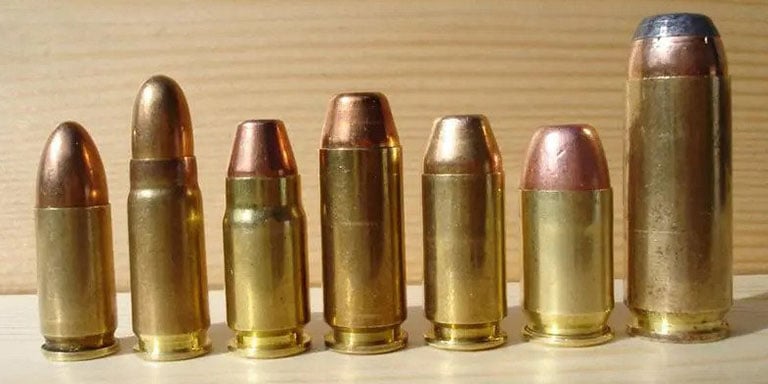
Handgun bullets are measured by caliber, which can be expressed in millimeters or inches. It's usually safe to assume that the unit of measurement is inches if it doesn't include the "mm" designation (e.g. "9mm" and "10mm"). See our ammo 101 guide for more information on calibers.
Handgun calibers are broadly classified as small, medium or large. Some of the most common and popular calibers include:
- .32 ACP (small)
- .380 (small)
- .22 LR (small)
- 9mm (medium)
- .40 (medium)
- .38 (medium)
- 10mm (large)
- .45 ACP (large)
- .357 or .44 Magnum (large)
Larger-caliber bullets travel faster and impact targets with greater force. Because the bullets themselves are bigger, the guns that fire them are bigger, too (although smaller, compact models (with reduced capacity) are popular). Many novice shooters buy small-frame, small-caliber guns on the assumption that they're easier to handle, but in one major respect, the reverse is true.
Although a 9mm bullet produces more recoil when fired than a .32 ACP round, a full-sized 9mm handgun is actually easier to handle than a compact .32 model. This is because the 9mm handgun's larger, heavier frame absorbs significantly more force than the .32's smaller, lighter frame, which results in the shooter feeling less recoil. If you're nervous about your ability to safely handle and control your first handgun, go for a full-sized, medium-caliber model (even though that may seem counterintuitive). Large calibers may not be a good choice for new shooters because, past a certain point, the recoil increases more sharply than the frame's ability to absorb it, and the gun becomes noticeably more difficult to handle.
Other Considerations
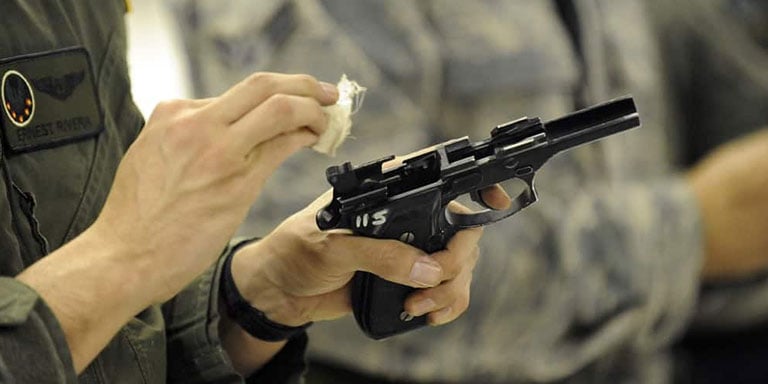
Once you've narrowed your choice of handgun down to a range of calibers, choose a handful of models that fit your budget and research these other important factors.
Reliability
This is arguably the most important thing to weigh in choosing a handgun, even though people's needs and preferences differ. Regardless of whether you need a handgun for personal defense, hunting, or recreation, you'll want it to fire when it's supposed to (and not fire when it's not supposed to). Choose a model with no known design or manufacturing-related safety issues and that fired at least 5,000 rounds in quality control tests with no malfunctions.
Safety Mechanisms
Some handguns have safeties designed to prevent the user from firing the gun accidentally, and some have no safety mechanisms other than the user's training and discipline. For experienced shooters, safety mechanisms are arguably unnecessary and even potentially dangerous, but as a new gun owner, you may benefit from the added reassurance.
Frame Size
A handgun's size and weight are important not only for recoil management purposes but also for concealability. If you plan to carry concealed, a compact or subcompact model will be much easier to hide on your person.
Ease of Use
All handguns should be relatively easy to use, but this is especially important for beginners. Handguns with overly complex safety mechanisms, or which require a dozen steps to disassemble, are less user-friendly and more likely to frustrate you.
Stopping Power and Capacity
Stopping power describes a firearm's ability to stop or incapacitate (not necessarily kill) an attacker. Stopping power has a fairly linear relationship with caliber and, for this reason, it has an inverse relationship with capacity. Bigger bullets take up more space in the cylinder or magazine, and thus fewer can be loaded at one time.
Price and Long-Term Value
Most experienced shooters agree that you should never buy a cheap gun. Buying an inexpensive gun is one thing, but you probably shouldn't go for the cheapest one in the store. If you're just looking for something basic to get the hang of shooting, and you plan to upgrade later, then an affordable (but safe and reliable) handgun could be the way to go. Alternatively, if you find a more expensive gun you love that fits your needs well, consider spending more up front on a handgun you'll keep for years or decades.
Try Before You Buy
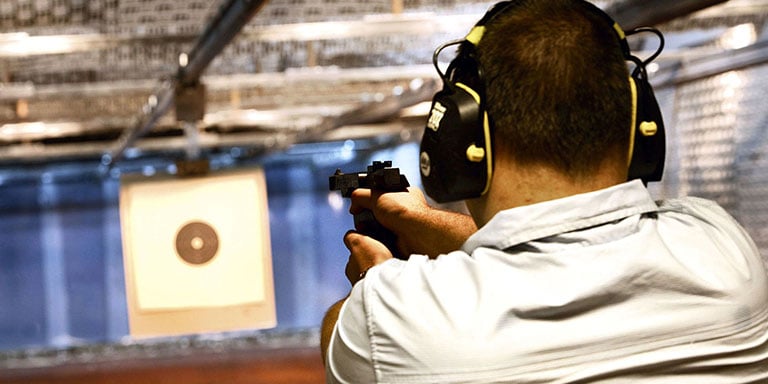
Once you've got a list of about half a dozen candidates, head down to your local gun store for some expert help. Let them know you're looking to buy your first handgun, show them your list, explain your needs and ask for advice or recommendations. They may not have the exact models you've researched in stock, but they may have similar models you can look at, or they may be able to recommend other, similar models you hadn't considered.
Although it's perfectly legal to buy guns online, at gun shows or from private sellers, we recommend buying your first gun at a shop. The employees can help you choose a gun well-suited to your needs. They can also help you complete your background check and stay compliant with other relevant laws. Be sure to take a look at our gun buyer's guide to used firearms if you're considering purchasing a used handgun.
If possible, visit a gun shop that also has a range. You can rent handguns for about $10 or $20 per hour and try them out before you buy. Indeed, this is the single best way to ensure that you're buying the right one. If you don't know anyone who can help you learn to shoot safely and well, sign up for a class. There are many resources tailored specifically to new gun owners, and experienced shooters are generally helpful and friendly. Just ask around and you'll surely find the help you need.
Accessories

As with most other industries, there are good and bad salesmen in the gun world. When you're ready to buy your new handgun, you'll need a few things to go along with it, but you certainly won't need the truckload of extras that some sellers may try to bundle with it. Only a few items are truly essential. You'll need to buy a holster, buy a pistol case, ammunition and basic cleaning supplies (see our guide to gun cleaning and maintenance basics for assistance), but most everything else is a luxury item at this stage. If you have children or irresponsible roommates, you can get a simple and effective cable lock for about $10.
If you're buying a handgun primarily for self-defense, consider also picking up a high-quality tactical light. This could be a weapon light that attaches to the gun itself, or you could buy a small but bright handheld flashlight. Most self-defense situations occur at night or in dark areas, so it's essential to be able to see your surroundings and your attacker. Take a look at our guide on how to choose a tactical flashlight to find the right light for you.
The most important thing you'll need to be a responsible handgun owner isn't something you can't buy (at least not directly): regular, effective training. Once you know the basic fundamentals of shooting and of firearm safety, practice them consistently. As long as you do so, and as long as you keep your handgun clean and well-maintained, it'll serve you well when you need it most.
Did you find this article helpful?


